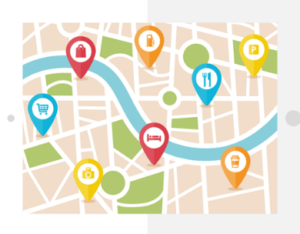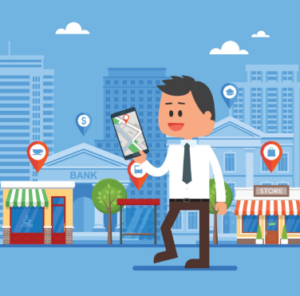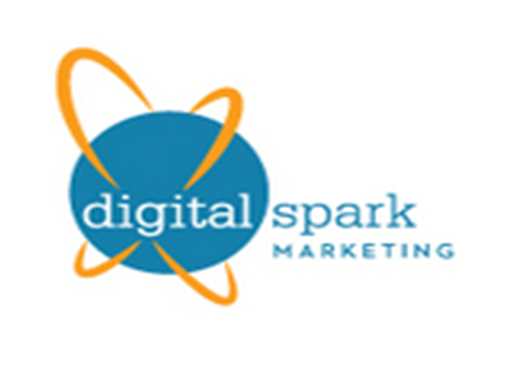Use geolocation marketing as an effective but undervalued way of reaching customers and growing your business. Every smartphone today has GPS technology that brands can use to send marketing messages straight to their customers.

In this blog we break down the basics to show you how you can use geo-location marketing for your small business.
Geolocation is just one digital marketing trend to look out for this year — click here to discover more digital marketing trends you need to know in 2019.
Use geolocation marketing … claim your online business listing
Before you get started with geo-location marketing, you need to claim your business’s location listing.
This is as simple as getting your business listed on platforms such as Google Places, Foursquare, and social media platforms (particularly Facebook and Instagram). Claiming your small business listing lets customers check-in on social media, add reviews, and find you on search engines.
And don’t do this by halves — when you claim your location, add every possible detail allowed. This means including your contact information, social profiles, opening hours, and so on. The more information you include on your business location listing, the better you’ll serve your customers.
Use geolocation marketing … narrow down your target market with geo-targeting
The most commonly deployed form of location-based advertising is geo-targeted adverts. Many platforms offer this service, including most major search engines and social networks. The idea is simple: ads are shown to specific user demographics based on location.
The scope for this can be as broad as a certain country or state, or as specific as city or zip codes. However, this can be further targeted to even more specific demographics using Google AdWords. The service has a handy feature that lets you go after certain income levels based on the average income for an area.
The ads you use can achieve a variety of goals. For example, using Facebook ads to grow your business means you can target customers by behaviors, demographics, and incomes as well as by region. As a result, you send special offers to relevant audiences in a given area, notify shoppers of a new brick-and-mortar store location, and tailor ads to specific stages of the typical buying journey.
Go after your competition’s customers with geo-fencing
Geo-fencing lets you target specific customers when they enter a preset, virtually fenced-off area. For example, if you held a pop-up store at an event or in a mall, you could then send a push notification to targeted customers when they drew near.

A personalized message to targeted individuals is ideal for drawing attention to new store locations or special events.
You can take geo-fencing even further by using it to go after your competition’s customers. Set up a virtual fence around a competing business and offer a discount code or a free sample for your own business. This is a legitimate marketing practice, known as geo-conquesting, that hijacks qualified leads and gets them into your marketing funnel.
The secret to this is to go for the soft sell. Don’t outright deride your competitors — simply acknowledge where your potential leads are headed, and gently push your own product as an alternative.
Use geolocation marketing … embrace beacon technology
Beacon technology has been around since at least 2013, and it’s still seen in geo-location marketing strategies today. The technology is simple: small Bluetooth devices beam out messages to shoppers with the requisite apps and Bluetooth enabled.
Beacons let brick-and-mortar retailers target customers with customized shopping experiences while they’re out and about. You can offer discount codes, let customers know about special offers, or target customers who might have left a store without making a purchase.
Digital businesses can get in on the action too
It’s not just businesses with a physical presence that can take advantage of geo-location marketing. Online businesses too can use targeted location-based marketing to go after customers they might otherwise have been unable to reach.
For example, let’s say that you run a small business selling activewear online. By setting up a geo-fence around a sporting event such as a fun run, you can target attendees (who are likely to be interested in your products) and direct them to your online store.

If you haven’t yet developed an online presence, do your research before choosing an online store developer. While most good ecommerce platforms offer elementary geo-location options, these often only provide the minimum viable product.
To successfully leverage geo-targeting, your store builder should let you use customer data analytics to create automated geo-location workflows based on a range of factors. This includes automatically customizing prices, tax and currency for all products, giving customers accurate shipping information, and changing language based on their location.
With the right integrations, you can even use geo-location data to personalize the shopping experience further. For example,
So if your Missouri customers are due for a particular hot few days, you could push your summer apparel line to them in with a personalized email
Geolocation is an effective marketing tactic that lets brands get their message straight to the customer. The tactics outlined above are only the tip of the iceberg. As you become more confident in using geo-location marketing, you will dynamically grow your business well into 2019

When things are not what you want them to be, what’s most important is your next step. Call today.
Are you devoting enough energy to improving your continuous learning for yourself and your team?
Mike Schoultz is the founder of Digital Spark Marketing, a digital marketing and customer service agency. With 40 years of business experience, he blogs on topics that relate to improving the performance of your business. Find them on G+, Twitter, and LinkedIn.
Digital Spark Marketing will stretch your thinking and your ability to adapt to change. We also provide some fun and inspiration along the way. Call us for a free quote today. You will be amazed how reasonable we will be.
More reading on customer engagement from our library:
Whole Foods Customer Engagement Using Social Media
Is Employee Engagement the Backbone of the Publix Culture?
13 Employee Engagement Lessons From Best Employee Brands
Positive Attitude Is Everything for Customer Engagement